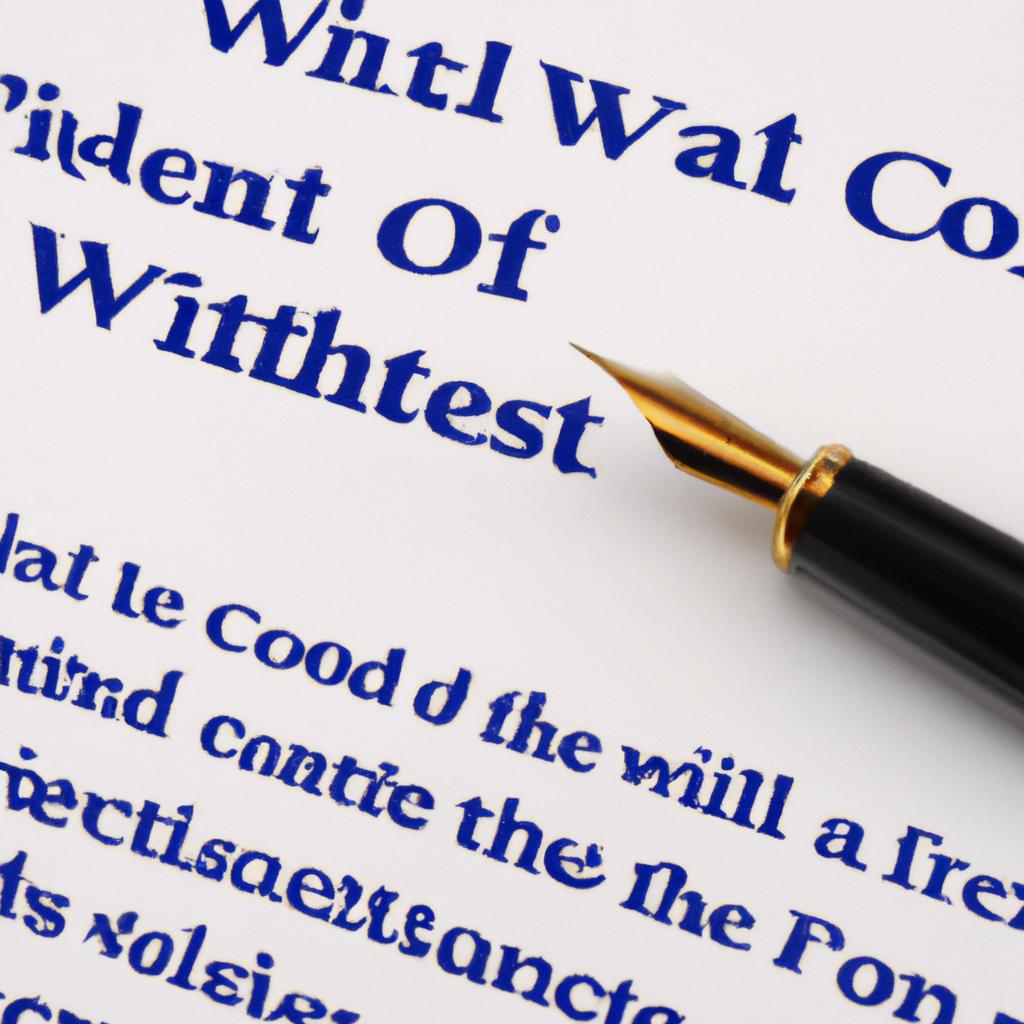In the intricate web of estate planning and familial dynamics, the exclusion of a child from a will can spark contentious legal battles and emotional turmoil. As experienced practitioners at Morgan Legal Group in New York City, we understand the complexities surrounding such delicate situations. In this article, we delve into the legal landscape to explore the key question: can a child contest a will if excluded? Join us as we navigate the nuanced terrain of estate litigation and shed light on the rights and remedies available to aggrieved heirs.
Potential grounds for a child to contest a will
When a child is excluded from a parent’s will, they may have grounds to contest the will. While each case is unique and subject to specific circumstances, some common reasons why a child may challenge a will include:
- Lack of capacity: If it can be proven that the testator was not of sound mind when the will was executed, the child may contest the validity of the document.
- Undue influence: If the child believes that someone exerted undue influence on the testator to change the will in their favor, they may contest the will on these grounds.
- Improper execution: A will must be executed in accordance with state laws. If there are irregularities in the execution process, the child may have legal standing to challenge the will.
| Grounds for Contesting a Will | Likelihood of Success |
|---|---|
| Lack of capacity | Depends on evidence presented |
| Undue influence | Difficult to prove, but possible |
| Improper execution | May result in a successful challenge |

Legal implications of excluding a child from a will
When a child is excluded from a will, it can raise several legal implications that may lead them to contest the will. One of the main reasons a child may contest a will is if they believe they were unfairly excluded or if they were not adequately provided for. In such cases, the child may argue that the exclusion was due to undue influence, lack of testamentary capacity, fraud, or mistake.
It is important to note that each state has different laws regarding the rights of children when it comes to challenging a will. In general, however, if a child successfully contests a will, they may be entitled to a share of the deceased parent’s estate. As experienced estate planning attorneys at Morgan Legal Group in New York City, we understand the complexities of these situations and can provide guidance on how to navigate the .

Factors to consider before contesting a will as an excluded child
Before moving forward with contesting a will as an excluded child, there are several important factors to consider:
- Evidence: You must have valid grounds to contest a will, such as lack of testamentary capacity or undue influence. Collecting evidence to support your claim is crucial.
- Legal costs: Contesting a will can be a lengthy and expensive process. Consider consulting with a probate attorney to assess the potential costs involved.
| Factor | Importance |
|---|---|
| Evidence | High |
| Legal costs | Medium |
It is also important to take into account the emotional toll that contesting a will can have on family relationships. Consider potential repercussions and whether the potential benefits outweigh the risks involved in challenging a will.

Recommendations for navigating the process of contesting a will as a child
When contesting a will as a child, there are several important recommendations to keep in mind to navigate the process effectively. Firstly, it is crucial to seek legal advice from a qualified estate lawyer who specializes in will contests. A knowledgeable attorney can guide you through the legal steps and provide valuable insights into the complexities of contesting a will.
Additionally, it is essential to gather all relevant evidence and documentation to support your claim. This includes any evidence of undue influence, lack of capacity, or fraud that may have impacted the creation of the will. Presenting a strong case with concrete evidence will significantly increase your chances of success in contesting the will. Remember, contesting a will can be a challenging and emotional process, but with the right legal representation and evidence, you can protect your rights and interests as a child.
Q&A
Q: Can a child contest a will if they have been excluded from it?
A: Yes, a child can contest a will if they have been excluded from it.
Q: What reasons might a child have for contesting a will?
A: A child may contest a will if they believe they have been treated unfairly or if they suspect foul play in the creation of the will.
Q: What is the process for contesting a will?
A: The process for contesting a will typically involves filing a legal claim, presenting evidence to support the claim, and potentially going to court to resolve the issue.
Q: Are there any time limitations for contesting a will?
A: Yes, there are usually strict time limitations for contesting a will, which vary depending on the jurisdiction.
Q: What are the potential outcomes of contesting a will?
A: The potential outcomes of contesting a will include having the will declared invalid, receiving a larger share of the estate, or settling the dispute outside of court.
Q: What should a child do if they feel they have been unjustly excluded from a will?
A: A child who feels they have been unjustly excluded from a will should seek legal advice to explore their options for contesting the will.
The Way Forward
In conclusion, the legal process of contesting a will as a child excluded from inheritance can be complex and emotional. It is important to seek professional legal advice to understand your rights and options in such situations. Ultimately, every case is unique and the outcome may vary. Remember to approach the process with patience and understanding as you navigate the challenging terrain of family inheritance disputes. Whatever the outcome, may you find peace and closure on your journey towards justice.
 “Can a Child Contest a Will if Excluded?” – A Comprehensive Guide
“Can a Child Contest a Will if Excluded?” – A Comprehensive Guide
One of the biggest concerns for many people when creating a will is ensuring that their assets are distributed according to their wishes after they pass away. However, what happens if a child is excluded from the will? Can they contest it? This is a common question that many parents and guardians have, and the answer is not as straightforward as one might think.
In this comprehensive guide, we will delve into the intricacies of whether a child can contest a will if they are excluded from it. We will explore the legal framework surrounding this issue and provide practical tips for parents and guardians to protect their wills from potential challenges.
Understanding the Legal Framework
The answer to whether a child can contest a will if excluded depends on several factors, including state laws and the circumstances surrounding the exclusion. In general, a will is a legally binding document that outlines how a person’s assets will be distributed after their passing. In most cases, the wishes stated in a will are binding and must be followed.
However, certain situations may arise where a child feels that they have been unfairly excluded and wants to challenge the will. In such cases, the legal process of contesting a will can be initiated. But before we delve into the details of how a will can be contested, let’s first understand the legal grounds that allow for such challenges.
1. Mental Capacity of the Testator – A will can be challenged if it is believed that the testator (the person who created the will) was not of sound mind at the time of writing the will. This means that they did not have the mental capacity to understand the consequences of their actions, such as excluding a child from their will.
2. Duress or Undue Influence – If a person can prove that the testator was coerced or unduly influenced into making changes to their will, the will can be contested. This could include exerting pressure on the testator to exclude a child from the will.
3. Fraud – If it can be proven that the testator was deceived while making changes to their will, the will can be challenged on grounds of fraud. This could include altering the will without the testator’s knowledge or including false information in the will.
4. Lack of Proper Execution – For a will to be valid, it must be executed according to state laws. If it is believed that the will was not properly executed, it can be challenged. This could include not having the proper number of witnesses or not being signed by the testator.
The Role of State Laws
When it comes to contesting a will, state laws play a significant role. Each state has its own laws and regulations regarding wills, and these laws determine the validity of a will and who can contest it. In some states, a child who has been excluded from the will may have the right to contest it, while in others, the laws may favor the testator’s wishes.
For example, in some states, such as California, a child who has been excluded from the will has the right to receive a portion of their parent’s estate through the state’s “elective share” law. This law ensures that a child, even if excluded from the will, does not receive nothing from their parent’s estate. In other states, such as Texas, this right may not exist, and a child can only contest a will if they can prove one of the previously mentioned legal grounds.
Practical Tips to Avoid Challenges to a Will
As a parent or guardian, the thought of your child contesting your will after your passing can be devastating. To avoid such situations, here are some practical tips that you can consider when creating your will.
1. Communicate with Your Children – One of the main reasons why children may contest a will is because they may feel that they have been unjustly excluded and have not been given an explanation for it. It is crucial to communicate with your children and explain your decision to exclude them from the will. This will help them understand your reasoning and potentially prevent any future challenges.
2. Be Transparent and Keep Records – When making changes to your will, be transparent, and keep records of all the changes. This will help in case a challenge arises and can provide evidence that the changes were made voluntarily and not under duress.
3. Consider a No-Contest Clause – A no-contest clause, also known as an in terrorem clause, is a provision in a will that penalizes any beneficiary who contests the will. If a child knows that contesting the will could result in them losing their share of the estate, they may be less inclined to challenge it.
First-Hand Experience from Case Studies
To further understand the complexities and real-life implications of a child contesting a will, let’s look at some case studies.
1. Oprah Winfrey – In 2011, Oprah Winfrey’s half-sister, Patricia Lofton, attempted to contest their mother’s will, claiming that she was promised a larger share of the estate. However, the will was ultimately upheld, and Oprah’s half-sister received the amount stipulated.
2. Robin Williams – After Robin Williams’ tragic passing in 2014, his children from his first two marriages contested a will that left his assets to his third wife and children. The case was settled out of court, with the children receiving a significant portion of the estate.
The Bottom Line
In conclusion, whether a child can contest a will if excluded depends on various factors, including state laws and the circumstances surrounding the exclusion. While it is possible for a child to challenge a will, there are steps that parents and guardians can take to help prevent such challenges. By communicating openly, keeping records, and considering a no-contest clause, you can protect your final wishes and ensure that your estate is distributed according to your wishes after your passing.


